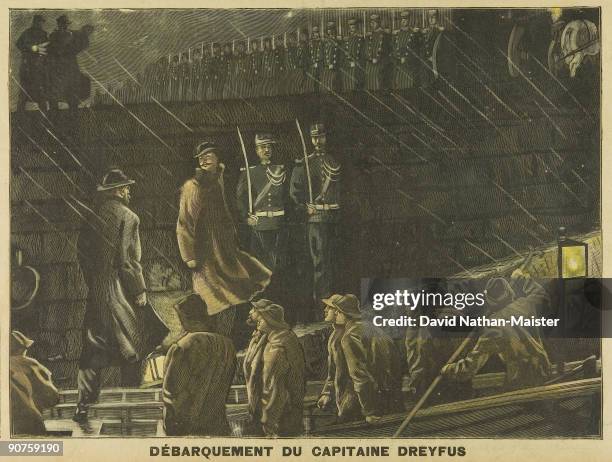Dreyfus Affair: A Century-Late Promotion Sought By French Parliament

Table of Contents
The Dreyfus Affair: A Brief Overview
The Dreyfus Affair, a watershed moment in late 19th-century France, involved the wrongful conviction of Captain Alfred Dreyfus, a Jewish officer in the French Army, for treason. Accused of leaking military secrets to Germany, Dreyfus was subjected to a deeply flawed and prejudiced trial in 1894, fueled by rampant antisemitism within the French military and broader society. Key players included Émile Zola, whose courageous "J'accuse" open letter exposed the injustice, and figures like Georges Picquart, who later uncovered evidence of Dreyfus's innocence. The case highlighted the pervasive antisemitism within the French Third Republic and the fragility of its institutions. The affair deeply divided French society, becoming a battleground over issues of justice, military honor, and national identity.
- False accusation of treason: Based on flimsy evidence and manipulated documents.
- Unfair trial and conviction: Marked by a lack of due process and blatant antisemitic bias.
- Zola's "J'accuse" open letter: A powerful denunciation of the military cover-up, sparking a national debate.
- Public outcry and division in France: The affair polarized the nation, with passionate supporters and opponents on both sides.
- Reversal of the conviction and Dreyfus's eventual exoneration: After years of struggle, Dreyfus was finally exonerated, though his reputation was irreparably damaged.
The Rationale Behind the Proposed Promotion
The recent proposal in the French Parliament to posthumously promote Dreyfus stems from a desire to formally acknowledge the profound injustice he suffered and to reaffirm France's commitment to fighting antisemitism and promoting justice. This posthumous promotion isn't merely a bureaucratic act; it carries significant symbolic weight.
- Recognition of the injustice suffered: A formal apology for the systematic persecution and wrongful conviction of Dreyfus.
- Symbol of national reconciliation and the fight against antisemitism: A powerful statement against prejudice and a commitment to social justice.
- Addressing historical wrongs and promoting social justice: A step towards healing past wounds and preventing similar injustices in the future.
- Political motivations and potential symbolism: The proposal reflects broader political conversations surrounding historical memory and national identity.
The Significance of the Symbolic Gesture
The symbolic importance of promoting Dreyfus transcends national borders. It’s a powerful statement about France’s reckoning with its past and its ongoing struggle against antisemitism.
- Impact on the perception of French history: A reevaluation of the Dreyfus Affair's place in French historical memory, acknowledging the role of antisemitism.
- Message to contemporary society about fighting prejudice and injustice: A reminder of the importance of speaking out against injustice and upholding the rule of law.
- International implications and its reflection on France's role in combating antisemitism: A signal to the international community of France's continued commitment to fighting antisemitism and promoting human rights.
Arguments For and Against the Promotion
While the proposed promotion enjoys widespread support, it hasn’t been without its detractors.
- Arguments in favor: Supporters emphasize the need for justice, symbolic reparation for a historical wrong, and the importance of addressing the legacy of antisemitism. The promotion is viewed as a powerful gesture of national reconciliation.
- Arguments against: Opponents raise concerns that the promotion is unnecessary, that focusing on this issue distracts from more pressing contemporary concerns, and that it might inadvertently reignite old divisions. Some argue that it could be seen as a form of political correctness gone too far. Concerns about historical accuracy and appropriate uses of symbolism are also raised.
Conclusion
The Dreyfus Affair remains a potent symbol of injustice and antisemitism. The French Parliament's proposal to posthumously promote Captain Alfred Dreyfus is not simply a bureaucratic act; it represents a powerful attempt at national reconciliation and a commitment to actively confronting the lasting legacy of this historical tragedy. The debate surrounding the promotion highlights the ongoing relevance of the Dreyfus Affair in contemporary society, forcing a critical examination of France's historical relationship with antisemitism and its commitment to upholding justice. The Dreyfus Affair serves as a stark reminder of the dangers of prejudice and the importance of vigilance against all forms of discrimination. Learning more about the Dreyfus Affair and its ongoing legacy is crucial to understanding the complexities of history and the persistent need for social justice. Further research into the Dreyfus Affair, and critical reflection on its contemporary relevance, is strongly encouraged.

Featured Posts
-
 Brest Urban Trail Les Visages De La Course
May 25, 2025
Brest Urban Trail Les Visages De La Course
May 25, 2025 -
 Bangladeshs Strategic European Partnerships Growth And Collaboration
May 25, 2025
Bangladeshs Strategic European Partnerships Growth And Collaboration
May 25, 2025 -
 Nuovi Dazi Usa Cosa Aspettarsi Per I Prezzi Del Tessile E Dell Abbigliamento
May 25, 2025
Nuovi Dazi Usa Cosa Aspettarsi Per I Prezzi Del Tessile E Dell Abbigliamento
May 25, 2025 -
 Road Closure Following Major Crash Emergency Services Respond
May 25, 2025
Road Closure Following Major Crash Emergency Services Respond
May 25, 2025 -
 Dazi E Mercati Finanziari L Ue Risponde Alla Crisi
May 25, 2025
Dazi E Mercati Finanziari L Ue Risponde Alla Crisi
May 25, 2025
Latest Posts
-
 Mia Farrow Trump Must Be Held Accountable For Venezuelan Gang Deportations
May 25, 2025
Mia Farrow Trump Must Be Held Accountable For Venezuelan Gang Deportations
May 25, 2025 -
 Farrows Plea Prosecute Trump For Handling Of Venezuelan Deportations
May 25, 2025
Farrows Plea Prosecute Trump For Handling Of Venezuelan Deportations
May 25, 2025 -
 Actress Mia Farrow Seeks Legal Action Against Trump Regarding Venezuelan Deportations
May 25, 2025
Actress Mia Farrow Seeks Legal Action Against Trump Regarding Venezuelan Deportations
May 25, 2025 -
 Mia Farrow Demands Trumps Imprisonment For Venezuelan Gang Member Deportations
May 25, 2025
Mia Farrow Demands Trumps Imprisonment For Venezuelan Gang Member Deportations
May 25, 2025 -
 Mia Farrow Calls For Trumps Arrest Over Venezuelan Deportations
May 25, 2025
Mia Farrow Calls For Trumps Arrest Over Venezuelan Deportations
May 25, 2025
